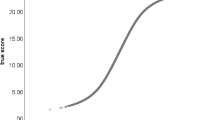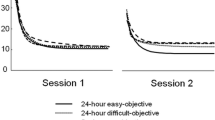Abstract
In a 2 × 2 × 2 crossed factorial design, trained or untrained subjects viewed a videotape and evaluated performance on either a familiar (college lecturer) or unfamiliar (salesperson) job. Prior to viewing the videotape, some subjects reviewed positive information about the ratee's prior performance, whereas other subjects did not review any prior performance information. To determine whether assimilation or contrast effects occurred, we compared ratings provided by subjects who reviewed positive information about prior performance with ratings provided by subjects who did not review any prior performance information. A three-way interaction was obtained. Ratings of performance on the familiar job by untrained or trained subjects revealed only a small assimilation effect. However, when rating performance on the unfamiliar job, a large assimilation effect was observed among untrained subjects, whereas a large contrast effect was observed among trained subjects. The results indicate that rater error training may reverse, rather than reduce or eliminate, rating errors that arise from knowledge of a ratee's prior performance. Implications for further understanding and reducing assimilation and contrast effects are discussed.
Similar content being viewed by others
REFERENCES
Athey, T. R., & McIntyre, R. M. (1987). Effect of rater training on rater accuracy: Levels of processing theory and social facilitation theory perspectives. Journal of Applied Psychology, 72, 567–572.
Bernardin, H., & Buckley, M. (1981). Strategies in rater training. Academy of Management Review, 6, 205–212.
Bernardin, H. J., & Pence, E. C. (1980). Effects of rater training: Creating new response sets and decreasing accuracy. Journal of Applied Psychology, 65, 60–66.
Buda, R., Reilly, R. R., & Smither, J. W. (1991). The influence of indirect knowledge of prior performance on evaluations of present performance: The generalizability of assimilation effects. Journal of Psychology and the Behavioral Sciences, 6, 89–99.
Cardy, R. L., & Keefe, T. J. (1994). Observational purpose and evaluative articulation in frame-of-reference training: The effects of alternative processing modes on rating accuracy. Organizational Behavior and Human decision Processes, 57, 338–357.
Cardy, R. L., & Kehoe, T. J. (1984). Rater selective attention ability and appraisal effectiveness: The effect of cognitive style on the accuracy of differentiation among ratees. Journal of Applied Psychology, 69, 589–594.
Darley, J., & Fazio, R. (1980). Expectancy confirmation processes in the social interaction sequence. American Psychologist, 35, 867–881.
Foti, R. J., & Hauenstein, N. M. A. (1993). Processing demands and effects of prior impressions on subsequent judgments: Clarifying the assimilation/contrast debate. Organizational Behavior and Human Decision Processes, 56, 167–189.
Hastie, R. (1980). Memory for behavioral information that confirms or contradicts a personality impression. In R. Hastie et al. (Eds.), Person memory: The cognitive basis of social perception (pp. 155–178). Hillsdale, NJ: Erlbaum.
Hauenstein, N. M. A., & Foti, R. J. (1989). From laboratory to practice: Neglected issues in implementing frame-of-reference rater training. Personnel Psychology, 42, 359–378.
Hedge, J., & Kavanagh, M. (1988). Improving the accuracy of performance evaluations: Comparison of three methods of performance appraiser training. Journal of Applied Psychology, 73, 68–73.
Herr, P. M., Sherman, S. J., & Fazio, R. H. (1983). On the consequences of priming: Assimilation and contrast effects. Journal of Experimental Social Psychology, 19, 323–340.
Kopelman, M. (1975). The contrast effect in the selection interview. British Journal of Educational Psychology, 45, 333–336.
Kravitz, D., & Balzer, W. (1992). Context effects in performance appraisal: A methodological critique and empirical study. Journal of Applied Psychology, 77, 24–31.
Lingle, J., & Ostrom, T. (1980). Principles of memory and cognition in attitude formation. In R. Petty, T. Ostrom, & T. Brock (Eds.), Cognitive responses in persuasion (pp. 399–420). Hillsdale, NJ: Erlbaum.
Maurer, T., & Alexander, R. (1991). Contrast effects in behavioral measurement: An investigation of alternative process explanations. Journal of Applied Psychology, 76, 3–10.
Martell, R. F., & Willis, C. E. (1993). Effects of observers' performance expectations on behavior ratings of work groups: Memory or response bias? Organizational Behavior and Human Decision Processes, 56, 91–109.
Murphy, K., Balzer, W., Lockhart, M., & Eisenman, E. (1985), Effects of previous performance on evaluations of present performance. Journal of Applied Psychology, 70, 72–84.
Pulakos, E. (1986). The development of training programs to increase accuracy with different rating tasks. Organizational Behavior and Human Decision Processes, 38, 76–91.
Pulakos, E. (1984). A comparison of rater training programs: Error training and accuracy training. Journal of Applied Psychology, 69, 581–588.
Salvemini, N. J., Reilly, R. R., & Smither, J. W. (1993). The influence of rater motivation on assimilation effects and accuracy in performance ratings. Organizational Behavior and Human Decision Processes, 55, 41–60.
Smither, J. W., & Reilly, R. R. (1987). True intercorrelation among job components, time delay in rating, and rater intelligence and determinants of accuracy in performance ratings. Organizational Behavior and Human Decision Processes, 40, 369–391.
Smither, J. W., Reilly, R. R., & Buda, R. (1988). Effect of prior performance information on ratings of present performance: Contrast versus assimilation revisited. Journal of Applied Psychology, 73, 487–496.
Srull, T., & Wyer, R. (1989). Person memory and judgment. Psychological Review, 96, 58–83.
Sulsky, L. M., & Day, D. V. (1992). Frame-of-reference training and cognitive categorization: An empirical investigation of rater memory issues. Journal of Applied Psychology, 77, 501–510.
Sulsky, L. M., & Day, D. V. (1994). Effects of frame-of-reference training on rater accuracy under alternative time delays. Journal of Applied Psychology, 79, 535–543.
Swann, W., & Read, S. (1981). Acquiring self knowledge: The search for feedback that fits. Journal of Personality and Social Psychology, 41, 1119–1128.
Webster, E. (1982). The employment interview: A social judgment process. Schomberg, Ontario, Canada: SIP Publications.
Woehr, D. J. (1994). Understanding frame-of-reference training: The impact of training on the recall of performance information. Journal of Applied Psychology, 79, 525–534.
Woll, S., & Graesser, A. (1982). Memory discrimination for information typical or atypical person schemata. Social Cognition, 1, 287–310.
Wyer, R., & Srull, T. (1981). Category accessibility: Some theoretical and empirical issues concerning the processing of social stimulus information. In E. Higgins, C. Herman, & M. Zanna (Eds.), Social cognition: The Ontario Symposium (pp. 161–197). Hillsdale, NJ: Erlbaum.
Author information
Authors and Affiliations
Rights and permissions
About this article
Cite this article
Reilly, S.P., Smither, J.W., Warech, M.A. et al. The Influence of Indirect Knowledge of Previous Performance on Ratings of Present Performance: The Effects of Job Familiarity and Rater Training. Journal of Business and Psychology 12, 421–435 (1998). https://doi.org/10.1023/A:1025098905241
Issue Date:
DOI: https://doi.org/10.1023/A:1025098905241




